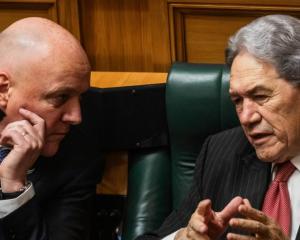
In stark contrast to the intense security of Kabul, Mr Key spent an hour or so wandering down the main street of Bamiyan town accompanied by the province's governor, Habiba Sarabi, wearing a traditional hat and saying hello to locals while checking out rugs for sale.
Members of the 140-strong New Zealand contingent here in the Provincial Reconstruction Team (PRT) were on hand in case anything went wrong but the mood was festive and friendly. People in the bustling town seemed oblivious to the army vehicles and armed men as they went about their business.
Mr Key also visited a girls' school from which there was a view of the remains of the famous Bamiyan buddhas, blown up by the former Taliban regime. During their rule girls were not allowed to attend school at all. Just in the past few days girls at a school in the country fell ill, believed poisoned by Taliban angered by their desire for an education.
Fifteen-year-old Mursal Nadir is attending the school. Her family moved to Bamiyan from Kabul and she hopes to become a doctor like her father.
Mursal told Mr Key that the school needed more rooms, younger students were sitting outside on rugs for their lessons, and there was a shortage of books and clean water.
Quality teaching staff were also at a minimum especially as there were so few educated women and culturally it was not appropriate for men to teach girls.
Mr Key tried to shake hands with one of the girls when he arrived, only to be gently rebuffed for what was deemed inappropriate contact. He told Mursal he would ask the PRT about more classrooms.
At Bamiyan Hospital Mr Key visited a laboratory building funded and built by New Zealand. The PRT team managed construction of all the buildings at the hospital and offered other support.
Walking the wards Mr Key dropped in as a man was having teeth extracted, walked into a ward where a measles sufferer lay beside others with serious illnesses, and chatted to patients and staff.
Nursing manager Uranous Sakhizada said about 200 outpatients a day came to the hospital for treatment with a further 70-80 inpatients. At this time of the year respiratory problems and pneumonia were common and maternity care was a big focus.
Mr Key flew out earlier than scheduled from Afghanistan before bad weather came in -- when he arrived in Bamiyan on Sunday the welcoming ceremony and haka were accompanied by a drenching thunder and lightening storm.
On Saturday Mr Key arrived in Kabul where he held meetings with Afghan President Hamid Karzai and General Stanley McChrystal, International Security Assistance Force (ISAF) commander. On arrival in Kabul he was choppered off for a meeting with Special Air Services members before taking the Hercules to Bamiyan.
Mr Key had felt compelled to visit the war-torn country.
"This is a dangerous place and I am asking New Zealanders to come here and represent New Zealand but, ultimately in doing that, to put their own lives on the line and I am not prepared to send people to a destination I am not prepared to come myself."
The trip was planned months ago but was kept secret for security reasons.
"The reason for that is just around my personal security and actually the security of the people that travel with me, the chief of the Defence Force (Jerry Mateparae), even you as journalists would be at greater risk if people knew that I was here because we would be a juicy target. And on that basis that is the standard that's applied to any sort of dignitary that comes here."
Former prime minister Helen Clark visited under a shroud of secrecy and more recently United States President Barack Obama did the same.
Mr Key said President Karzai was grateful for New Zealand's contribution to ISAF.
The Prime Minister said after meeting with the SAS in the capital he would consider extending their term beyond March and rolling over the PRT commitment by another year to September next year.
Mr Key said the importance of New Zealand's involvement was "huge" and important to global solidarity.
"Individually no one country can stabilise Afghanistan but I think 46 on a combined basis can. Secondly the New Zealanders are very just very good at what they do."












